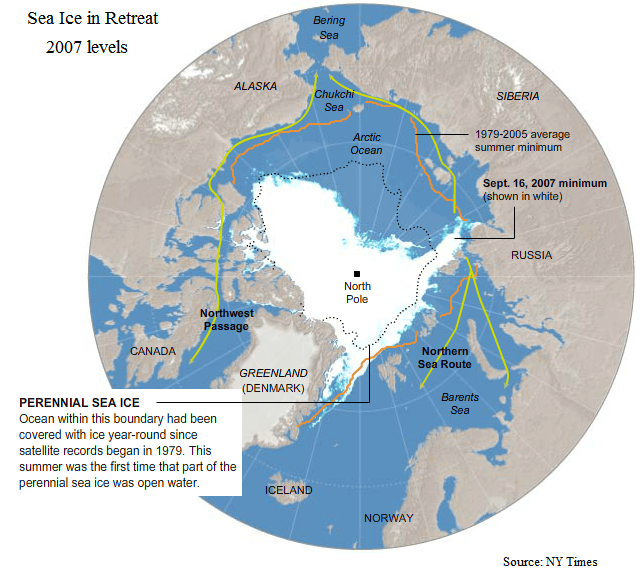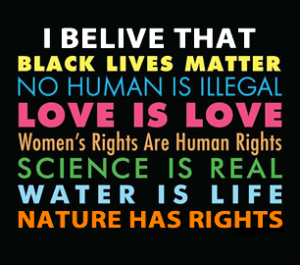Environmental Security and Global Warming
Back in 2007 the Carnegie Council held a symposium on environmental security, in which a number of academics working or thinking about this question had submitted related papers, with the featured piece being an article called Ecological Intervention: Prospects and Limits by Robyn Eckersley. This paper and several responses then appeared in Carnegie’s Ethics & International Affairs, Volume 21.3 in the Fall of 2007.
 One of those contributors, Simon Dably, was the reason I had come to this site to begin with. Dably has written on environmental security in two different books, and I had just watched an interview from the summer of 2009 with him talking about his latest book at the time, Security and Environmental Change. I had come across this as part of my dissertation proposal work, which seems to continue pulling me to questions of militarism, security and conflict, whether I like it or not. In particular, I had just finished The Discovery of Global Warming by Spencer Weart, and through a long and tangential set of searches starting with an 1896 paper on global warming and CO2 by the Swedish Nobel chemist Svante Arrhenius (the paper was titled “On the Influence of Carbonic Acid in the Air upon the Temperature of the Ground“), I had ended up on a search for the intersection of global warming science and questions of ecological security. I know, a pretty odd set of tangents.
One of those contributors, Simon Dably, was the reason I had come to this site to begin with. Dably has written on environmental security in two different books, and I had just watched an interview from the summer of 2009 with him talking about his latest book at the time, Security and Environmental Change. I had come across this as part of my dissertation proposal work, which seems to continue pulling me to questions of militarism, security and conflict, whether I like it or not. In particular, I had just finished The Discovery of Global Warming by Spencer Weart, and through a long and tangential set of searches starting with an 1896 paper on global warming and CO2 by the Swedish Nobel chemist Svante Arrhenius (the paper was titled “On the Influence of Carbonic Acid in the Air upon the Temperature of the Ground“), I had ended up on a search for the intersection of global warming science and questions of ecological security. I know, a pretty odd set of tangents.
Long story short, I was watching a video from Carnegie with Simon Dalby talking about the idea of environmental security [watch here], when I found my way to the symposium that Carnegie had done on this related topic, and the interaction between Eckersley, Dalby and Humphreys via their papers is quite interesting. Shortly after reading those I happened upon a current news story about one of the many unintended side effects of the recent tsunami that hit Japan, which was the washing up on Oregon’s coast of invasive plants from Japan. Apparently a large chunk of dock had slowly been traveling across the ocean currents and finally made it’s way to the coast, and there was concern that this might be the start of a growing future trend of invasive species migration caused by global ecological disasters like happened in Japan.
Add to this the past few years of extremely erratic weather and it’s not hard to see why increasingly more people in the US are waking up to the reality that global warming and climate change are real, are here, and are not going away. As a recent NYT article put it:
“Dr. Leiserowitz said that recent events might be puncturing the public’s “very simplistic mental model of what global warming is supposed to be.”
Past survey work had suggested, he said, that people tended to see the climate change problem as “distant in time and space — that this is an issue about polar bears or maybe Bangladesh, but not my community, not the United States, not my friends and family.”
 And as a recent poll commissioned by the Yale Project on Climate Change Communication, “Americans’ Global Warming Beliefs and Attitudes in March 2012” revealed, 70% of respondents agreed that “global warming is affecting the weather in the United States.” And as in the past, there is the steady 10% of climate deniers who think that everything is just peachy, that dinosaurs probably grown on trees, and that capitalism is the solution to everything–after all, isn’t that’s what the Gospel of Wealth tells us–or is it that domestic violence is perfectly acceptable, I always get those two doctrines confused.
And as a recent poll commissioned by the Yale Project on Climate Change Communication, “Americans’ Global Warming Beliefs and Attitudes in March 2012” revealed, 70% of respondents agreed that “global warming is affecting the weather in the United States.” And as in the past, there is the steady 10% of climate deniers who think that everything is just peachy, that dinosaurs probably grown on trees, and that capitalism is the solution to everything–after all, isn’t that’s what the Gospel of Wealth tells us–or is it that domestic violence is perfectly acceptable, I always get those two doctrines confused.
And for the ice(ing) on the polar cake, the latest data from the Arctic Ice sheets is truly amazing, with so much polar ice melting in the last several years that even perennial ice flows are gone in parts of the Artic. By 2050, there may hardly any ice left to melt, and the long-sought perpetually-open Northern Passage will be a reality. Yippee skippee, just what we need to get those cheap Chinese goods to the American market even quicker! Golly gee, thanks global warming.
Until next time…invest now in Eastern Pennsylvania, it’ll beach front property for your grandkids
###


